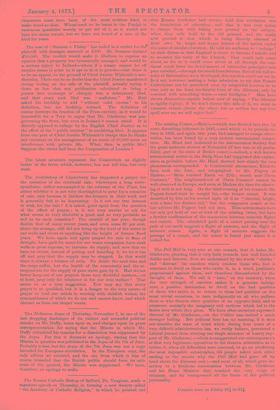The Archbishop of Canterbury has suggested a prayer for the
cessation of the continual rain, whereupon a long corre- spondence, rather unexampled in the columns of the Times, has arisen whether it is not very shortsighted to pray for a cessation of rain only because it hinders the farmers in their work and is generally felt to be depressing. Is it not our true interest to wish for the rain ? it is asked, quite apart from the question of the effect of prayer ; is it not very unwise to ask for what seems so very doubtful a good and so very probable an evil as its early cessation? The rainfall of last year, though double that of many recent years, and even some 30 per cent. above the average, still did not bring up the level of the water in our wells and rivers to anything like the height of former flood years. We have again and again prayed for rain in time of drought, have paid for water for our water companies, have sunk -wells at great expense, to increase its supply, and now that we have an excess, instead of prizing and hoarding it, we let it run off and pray that the supply may be stopped. In this world there is always a balance of evils. No doubt the seed time and the crops suffer, but the health of the community and the ar- rangements for the supply of pure water gain by it. Had we not better keep out of our prayers these very doubtful matters,—or at least, pray only for whatever is for our true welfare ? That seems to us a true suggestion. You may say that every prayer is so qualified, but it is a danger to the very nature of prayer to load our minds in worship with childish wishes, the reasonableness of which we do not and cannot know, and which distract us from our deeper wants.










































 Previous page
Previous page